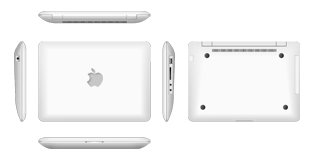Netbook uses new Via chips
Mar 19, 2009 — by LinuxDevices Staff — from the LinuxDevices Archive — 6 views The Chinese company Top Crown Technology announced a netbook using Via's 64-bit Nano processor and VX855 northbridge/southbridge. The “3G Netbook” includes a 10.1-inch display, hard disk drive (HDD) or solid state drive (SSD) storage, WiFi, Bluetooth, and HSDPA (high speed downlink packet access), the… company claims.
The Chinese company Top Crown Technology announced a netbook using Via's 64-bit Nano processor and VX855 northbridge/southbridge. The “3G Netbook” includes a 10.1-inch display, hard disk drive (HDD) or solid state drive (SSD) storage, WiFi, Bluetooth, and HSDPA (high speed downlink packet access), the… company claims.
(Click here for a larger view of Top Crown Technology's 3G Netbook)
Whether the 3G Netbook yet exists as anything more than a rendering, decorated with backwards Apple logos, is perhaps open to question. One way or another, however, Top Crown is the first company to announce a netbook combining two interesting components from Via: the 64-bit Nano processor and the VX855 northbridge/southbridge.

Yes, that's an elppA logo on Top Crown's netbook
The Nano features out-of-order execution, similar to Intel's Core Duo architecture, and, in third-party tests, has run up to 30 percent faster than the Atom N270 typically used in netbooks. Meanwhile, the recently announced VX855 can decode 1080p HD video in H.264, MPEG-2, MPEG-4, and VC-1 formats, while using only 40 percent of a host CPU's resources, according to Via.
Together, a 1.3GHz Nano and VX855 use just 10.3 Watts, and readily outperform the N270, with its standard 82945GSE northbridge and ICH7M southbridge, Via claims. But while this sounds like the proverbial marriage made in heaven, the two Via chips haven't been combined before. In its new Surfboard C855 Reference Design for mini-notebooks, the chipmaker mixes the VX855 with its older C7M-ULV CPU. And shipping Nano netbooks such as Samsung's NC20 use the Nano, but with Via's older VX800 northbridge/southbridge chip. (An impressive video showing much faster the Nano-based NC20 boots, compared to an Atom-based netbook — at least with Intel's Moblin Linux stack — can be found here).
If Top Crown's 3G Netbook is actually rolling off assembly lines in Shenzen, then, it's a first. The only other similar Nano-powered device we've seen is TechCrunch's Linux-based CrunchPad tablet PC, an open-source device that is still in prototype stage.
Apart from the Via chips, the Top Crown device is claimed to have typical netbook ingredients, including a 10.1-inch, LED-backlit display, a webcam, stereo speakers, three USB 2.0 ports, an SD/SDHC/MMC card reader, and a VGA output.
According to Top Crown, the 3G Netbook has a 10/100 Ethernet port, 802.11b/g wireless, and Bluetooth. An HSDPA (high speed downlink packet access) cellular modem is also included, though in the form of a USB dongle rather than an internal device, the company says.
Top Crown says the 3G Netbook is available with a 2.5-inch SATA HDD in sizes from 40GB to 160GB, or SSD storage in capacities from 16GB to 64GB. Offered with three- or six-cell batteries, the device runs Linux or Windows XP.
Features and specifications listed by Top Crown for the 3G Netbook include
- Processor — 1.3GHz Via Nano
- Memory — Accepts up to 2GB of DDR2 RAM via single SODIMM slot
- Display — 10-inch display with 1024 x 576 resolution and LED backlighting
- Camera — 0.3 megapixel or 1.3 megapixel webcam
- Storage — Supports 2.5-inch SATA HDDs from 40GB to 160GB, or SSDs from 16GB to 64GB
- Networking — 10/100 Ethernet
- Wireless:
- LAN — 802.11b/g
- PAN — Bluetooth 2.0
- WAN — 3.5G HSDPA, via USB dongle
- LAN — 802.11b/g
- Other I/O:
- VGA port
- 3 x USB
- DC input
- Mic in
- Headphone output
- VGA port
- Expansion — SD/MMC/MS card reader
- Battery — Supports three- or six-cell batteries
- Dimensions — n/s
- Weight — n/s
Availability
Top Crown provided no information about pricing or availability of its 3G Netbook. More information on the Surfboard may be found on the company's website, here.
This article was originally published on LinuxDevices.com and has been donated to the open source community by QuinStreet Inc. Please visit LinuxToday.com for up-to-date news and articles about Linux and open source.